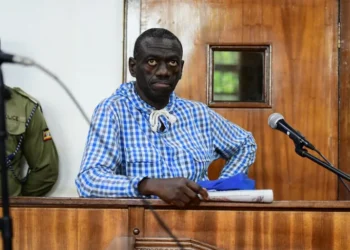According to the latest figures shared by the International Committee of the Red Cross (ICRC), 64,000 cases of disappeared persons have been reported across Africa.
In Nigeria alone, over 25,000 people have been reported missing and almost 14,000 or more than half of the missing are children.
There are over 35 active armed conflicts in Africa today and thousands of people, including children, cross borders, the Sahara Desert and the Mediterranean Sea in search of safety and better life each year. Such movements often entail great risk, including the risk of disappearance.
Documented cases of missing persons are on the rise; however, the ICRC warns that the actual figures are much higher.
“Sadly, the almost 14,000 children registered does not capture the full scope of this often-neglected and tragic humanitarian issue. There is no doubt that there are more children whose fate remains unknown”.
Yann Bonzon, head of delegation for the ICRC in Nigeria.
During displacement, children face risks such as exploitation, violence, mental distress and disappearance. Many also end up alone, with no news of their families’ whereabouts. The ICRC has more than 5,200 documented cases of unaccompanied children in Africa.
Patrick Youssef, the regional director for ICRC in Africa, called for the right policies to be put in place to protect migrants and displaced people.
“Having the right policies in place can save lives. It is an essential step to protect migrants and families of missing persons. This is a question of humanity and human dignity. Families of the disappeared face immense pain and obstacles that often transcend generations. They are stuck in limbo, unable to move forward or grieve. The search for their loved ones never ends”.
Patrick Youssef
From January to June 2022, the ICRC together with the Nigerian Red Cross Society (NRCS), assisted in the exchange of 1,250 Red Cross Messages containing family news and reunited 31 separated children/unaccompanied minors with their families while 440 phone calls were provided to families to maintain family contact.
In addition, families of 377 persons received information about the whereabouts or fate of their loved ones and 146 families of missing persons received psychosocial, economic, legal and administrative support through the Accompaniment Program for Families of the Missing.
The International Day of the Disappeared
The International Day of the Disappeared, marked on August 30 each year, is a day created to draw attention to the fate of individuals imprisoned at places and under poor conditions unknown to their relatives and/or legal representatives.
The impulse for the day came from the Latin American Federation of Associations for Relatives of Detained-Disappeared (Federación Latinoamericana de Asociaciones de Familiares de Detenidos-Desaparecidos, or FEDEFAM), a non-governmental organization founded in 1981 in Costa Rica as an association of local and regional groups actively working against secret imprisonment, forced disappearances and abduction in a number of Latin-American countries.
Work on secret imprisonment is an important part of the activities for a number of international bodies and organizations in the fields of human rights activism and humanitarian aid, including for example Amnesty International (AI), the Office of the United Nations High Commissioner for Human Rights (OHCHR) and the International Committee of the Red Cross (ICRC).
The International Day of the Disappeared is an opportunity to highlight these institutions’ work, increase public awareness, and to call for donations and volunteers.
Of those agencies, the ICRC has additional privileges due to its special status as a non-governmental sovereign entity and its strict policy of neutrality. In some cases, the ICRC is the only institution granted access to specific groups of prisoners, thereby enabling a minimum level of contact and inspection of their treatment. For affected families, messages transmitted by the ICRC are often the only hint about the fate of these prisoners.
READ ALSO: BoG Confident Inflation Will Peak Later This Year





















